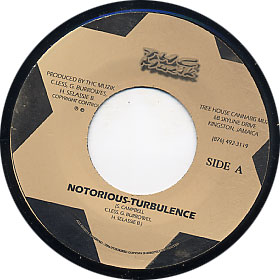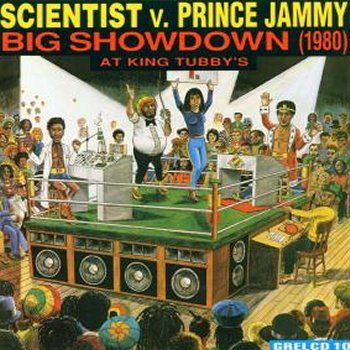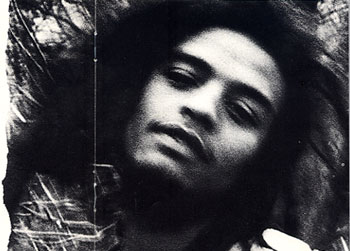
“What? Is this some kind of post-ironic ironic thing?” – a fictional uncarved blog reader…
Cos, obviously he’s rubbish reggae, isn’t he? The apotheosis of crossover crapness – watered down JA vibes for tourists on beaches and that guy from accounts who made an arse of himself at this office party. It’s reggae-lite for people who don’t get all excited by how weird Lee Perry is. Innit?
Well, let’s examine the evidence…
Max Elliot was born on 10th June 1962 in Lewisham. His dad was a steelworker and his Mum divvied up her time between her children and the church. She named the 8th of her offspring Max after her fondness for Max Bygraves. Max grew up in south London, going to the same school as footballer Ian Wright (who he’d later nearly hug the living death out of on “This is Your Life”).
I imagine growing up as a teenage black youth in 70s London it would have been nigh-on impossible to avoid reggae. At some point Max embraced rastafari and changed his name to Maxi Priest (after Priest Levi, one of the figureheads of the 12 tribes of Israel – I did have a quick look into this, but got a bit lost!).
Perhaps surprisingly, given his involvement in the church choir, Maxi’s first involvement with the reggae scene was technical and not musical. Having trained as a carpenter he was invited to build speaker boxes for none other than Saxon Studio International – the ruling sound of the day.
Throughout the 80s, Saxon cornered the market in UK dancehall. They clashed everyone from Lloyd Coxsone to Jah Shaka, eventually going all the way to New York to beat all comers in the world clash. Saxon are probably best known for their fast chat MCs like Papa Levi, Asher Senator and Smiley Culture, who became internationally respected and successful. But Maxi sang alongside the DJs and would eventually eclipse them all.
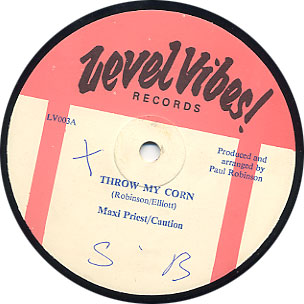
After some time on the sound Maxi collaborated with Paul Robinson (aka Barry Boom) and his band Caution on the Level Vibes label. His first solo single Throw My Corn was released in 1984 and reached number 1 in the reggae charts (well, one of the reggae charts, anyway) in August of that year.
The tune is upbeat and happy, but still heavy on the bass. “Throw my corn but call no fowl – if you wanna pick it up it’s your business”. An old expression from yard, perhaps best known because of the different tune by Larry Marshall of (nearly) the same title, which coined the name of the foundation riddim.
What does it mean? Err, ok. Originally “Me t’row carn, me no call me neighbour fowl”, it’s about showing yourself by your actions, not your words. I’m guessing (“no shit, John”), but it’s along the lines of “I’m not calling you a chicken because you ate my chicken feed, but people can make their own minds up about what you’re like…”
The b-side was even better. Strolling On isn’t exactly meat and drink to hardcore roots fans – “Strolling along… with a beautiful girl like you…” – but it is a shining example of the variety and quality of mid 80s UK reggae. The version took things one step further with some fantasticly melancholic horns, horns that make you feel…
Caution – Strolling On Version (Level Vibes 1984) zipped mp3
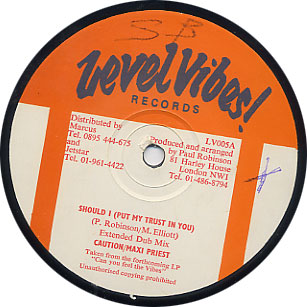
The 2nd solo single, Should I was released shortly after and reached number 1 in (one of) the reggae charts in December of 1984. This was a definite progression (tho perhaps not in the “correct” direction for the purists). The production is extremely glossy and commercial, and it was around this time that Maxi signed a major deal with 10 Records (a subsidiary of Virgin).
It shouldn’t be forgotten that there was, and remains, a huge market for this sort of reggae – mainly amongst women. Of course the lyrical themes (in this case, being wronged by his woman, but still wondering if he should let her “stick around”) and production values do not lend themselves to being leapt on by crate-digging fanboys decades after the event, but there are some great tunes in the “lovers rock” genre which exist on their own terms, for their own fanbase.
Lovers rock is as important, in its own way, as Shaka-esque steppers, or cockney chat in terms of the UK’s place on the reggae map. It’s a sub-genre which was crystalised in the UK, and named in south London, which then became popular “back a yard”. There are some moves to re-evaluate the more “cultural” aspects of lovers at the moment but it remains hugely ignored by all except its target audience…
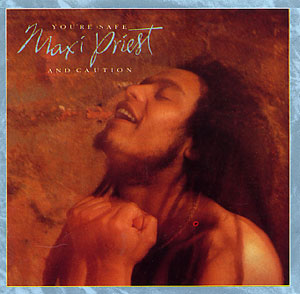
The first fruit of the deal with 10 Records was the album You’re Safe. Now… this is definitely still reggae, but it’s about as far removed from dour sufferation laments as is possible. For sure, the first track is about “singing songs of freedom”, but it’s actually a jaunty number about birds singing in springtime, complete with backing singers chirping “tweet tweet”!
Even upbeat tracks like Caution or the title track with its “Worries in the Dance” refrain have their toughness submerged under a slick 80s production. Somebody was clearly putting a lot of energy behind Maxi at this point, which is certainly an interesting insight into the popularity and commercial prospects for reggae at the time. (Where is the UK Sean Paul? or is that my bias – maybe it’s that young rascal chap?).
Of course, the investment paid off – big time.
Maxi has now sold more records in his lifetime than Bob Marley did in his (curtailed as it was). He’s travelled the world promoting reggae and fusing it with other genres. And yeah, maybe he’s strayed too far from my tastes on occasion, but the fact that he’s sustained himself as a reggae artist throughout 20 years in the dog-eat-dog music business is worthy of some serious respect.
His cover of Derrick Harriott’s Some Guys Have All The Luck went top 20 in 1987. Which is cheesy as you like, yes, but check these lyrics (and read them through gritted teeth in a slightly aggressive fashion. If you don’t understand what I’m talking about, then you’re probably not bitter and twisted enough to be reading this blog, right?)
Alone in a crowd on a bus after work
and I’m dreaming
The guy next to me has a girl in his arms
My arms are empty
How does it feel when the girl next to you
says she loves you
It seem so unfair when there’s love everywhere
but there’s none for me
Some guys have all the luck
Some guys have all the pain
Some guys get all the breaks
Some guys do nothing but complain
Probably his best known tune Wild World (originally by Cat Stevens) hit the top 5 in 1988 (and sounds way better than I remember it – maybe I am just getting too goddamn old or something).
Housecall, his collaboration with Shabba Ranks, was a huge hit and it was Maxi’s “Shabba!” call which was sampled so much that it became a part of UK popular culture – Peter Kay being able to raise a laugh off the back of it on “Phoenix Nights”.
And Maxi is still on it: last year’s I Believe was one of the most popular cuts on Donovan “Vendetta” Bennett’s huge “Drop Leaf” riddim. A recent interview on David Rodigan’s Kiss FM show proved that Maxi was still happy and humble, even just after 17,000 people stayed out in the Miami rain to see him peform.
It all started on Saxon, and soundsystem is still a big part of Maxi’s perspective as this recent quote shows:
“The experience of being on the sound systems, through all the ups and downs, is what put me here today. I keep my ear to the ground and I’m very much aware of what’s going on in dancehall and bashment. I like to think I’m somewhat of a foundation for that, just as I looked at John Holt, Beres Hammond and Dennis Brown as the foundation for what I do.”
Soon come: The Papa Levi connection.
